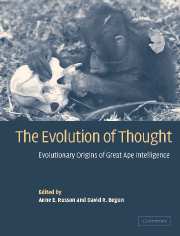Book contents
- Frontmatter
- Contents
- List of Contributors
- Preface
- 1 Evolutionary reconstructions of great ape intelligence
- 2 Enhanced cognitive capacity as a contingent fact of hominid phylogeny
- PART I COGNITION IN LIVING GREAT APES
- Introduction
- 3 The manual skills and cognition that lie behind hominid tool use
- 4 The cognitive complexity of social organization and socialization in wild baboons and chimpanzees: guided participation, socializing interactions, and event representation
- 5 Gestural communication in the great apes
- 6 Great ape cognitive systems
- PART II MODERN GREAT APE ADAPTATION
- PART III FOSSIL GREAT APE ADAPTATIONS
- Part IV INTEGRATION
- Author index
- Species index
- Subject index
4 - The cognitive complexity of social organization and socialization in wild baboons and chimpanzees: guided participation, socializing interactions, and event representation
Published online by Cambridge University Press: 20 August 2009
- Frontmatter
- Contents
- List of Contributors
- Preface
- 1 Evolutionary reconstructions of great ape intelligence
- 2 Enhanced cognitive capacity as a contingent fact of hominid phylogeny
- PART I COGNITION IN LIVING GREAT APES
- Introduction
- 3 The manual skills and cognition that lie behind hominid tool use
- 4 The cognitive complexity of social organization and socialization in wild baboons and chimpanzees: guided participation, socializing interactions, and event representation
- 5 Gestural communication in the great apes
- 6 Great ape cognitive systems
- PART II MODERN GREAT APE ADAPTATION
- PART III FOSSIL GREAT APE ADAPTATIONS
- Part IV INTEGRATION
- Author index
- Species index
- Subject index
Summary
INTRODUCTION
Is the intelligence of monkeys and apes primarily a “Machiavellian” adaptation for social life, an ecological adaptation for resource exploitation, or both a social and an ecological adaptation? How can we evaluate these competing models of intelligent adaptation? Are great apes really smarter than monkeys? How can we assess the cognitive complexity of social life? Are the social organizations and/or social roles of great apes more complex than those of monkeys? If they are, do different developmental and acquisition processes underlie that greater complexity, and which models are useful for studying those processes? Similarly, how is socioecological knowledge distributed and transmitted from one generation to the next, and what models are useful for studying this process? All these questions plague efforts to characterize great ape cognition and to reconstruct its evolution.
Systematic evaluation of social and/or ecological hypotheses about primate cognition calls for an integrated framework for comparing the sophistication of social organization and socialization in wild primates. Despite keen interest in specific topics in social cognition (e.g., social learning, social communication), a comprehensive ecologically based framework for comparing primate social cognition is currently lacking.
In this chapter, I propose such a framework. Specifically, this comparison can be made in terms of (1) the number, function, and composition of activity subgroups within primate range groups; (2) the social roles the members of these activity subgroups play; and (3) the typical routines or scripts in which these roles are played.
- Type
- Chapter
- Information
- The Evolution of ThoughtEvolutionary Origins of Great Ape Intelligence, pp. 45 - 60Publisher: Cambridge University PressPrint publication year: 2004
- 4
- Cited by



